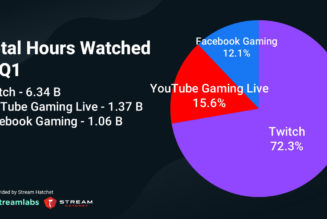Twitter is creaking. Social media seems less fun than ever. Maybe it’s time to get a little more personal.
Share this story
:format(webp)/cdn.vox-cdn.com/uploads/chorus_asset/file/3423214/7024888627_3257c520fd_k.0.jpg)
In the beginning, there were blogs, and they were the original social web. We built community. We found our people. We wrote personally. We wrote frequently. We self-policed, and we linked to each other so that newbies could discover new and good blogs.
I want to go back there.
The Web 1.0 landscape looked a lot different than the Web 2.0 experience we are used to these days, and personal weblogs or “blogs” were a big part of the evolution of Web 2.0.
In those days, it was really simple. You could sign up for a free site on GeoCities, Yahoo, Blogger, Diaryland, or any of a number of free hosting sites that allowed you to set up your blog, get going with a WYSIWYG editor, and send your thoughts out into the world.
For those who were a little more adventurous, you could purchase an actual domain name, pay for website hosting, and go for it that way.
Whichever model a person chose, they were typing their long and short-form thoughts into a screen and sending them out into the world to be consumed by the masses — whomever those masses were.
Social media wasn’t a thing that existed back then, so all our pontificating on various topics took place on our personal weblogs, and the discussions happened in the comments section of said blogs. It was a golden time.
People were way more connected to each other. There wasn’t a whole lot of anonymity because anyone could look up your WHOIS information and see who a blog actually belonged to. Trolls were simply banned from your comment section, never to be heard from again.
When Twitter came along, it started as a “microblogging” platform where people would go to put out short, frequent missives as opposed to the longer, personal pieces we put on our blogs. It, too, evolved, as these things do, and now it is the hellscape we at once loathe but can’t leave alone.
Watching the demise of Twitter under the helm of Elon Musk has made me nostalgic for the personal blogging days. The decline of Twitter with the current erosion of legacy media has left me thinking we need to bring personal blogging back with a vengeance.
a:hover]:shadow-highlight-franklin [&>a]:shadow-underline-black dark:[&>a:hover]:shadow-highlight-franklin dark:[&>a]:shadow-underline-white md:text-30″>Control your own platform
The biggest reason personal blogs need to make a comeback is a simple one: we should all be in control of our own platforms.
If what is happening on Twitter hasn’t demonstrated it, our relationship with these social media platforms is tenuous at best. The thing we are using to build our popularity today could very well be destroyed and disappear from the internet tomorrow, and then what?
What happens to all the content you have created? Where will the archive of all your funny memes and jokes be? What is going to happen to all those selfies you felt cute in but didn’t delete later?
The answer is we don’t know because we don’t control Twitter (or Facebook or Instagram or Snapchat or TikTok). If one of these companies decided to shut down their service permanently, there would be nothing we could do about it.
Owning your content and controlling your platform is essential, and having a personal blog is a great way to do that.
a:hover]:shadow-highlight-franklin [&>a]:shadow-underline-black dark:[&>a:hover]:shadow-highlight-franklin dark:[&>a]:shadow-underline-white md:text-30″>Personal storytelling is a lost art that needs to return
The best blogs gave us a glimpse into the life of someone we “knew” online. Good storytelling, coupled with a lively discussion afterward, kept us coming back for more day after day.
Twitter threads just don’t do the trick — and neither will Elon’s alleged plan for allowing 4,000-character tweets (I swear, if I see anyone tweeting out 4,000 characters, that is an immediate block).
Personal stories on personal blogs are historical documents when you think about it. They are primary sources in the annals of history, and when people look back to see what happened during this time in our lives, do you want The New York Times or Washington Post telling your story, or do you want the story told in your own words?
a:hover]:shadow-highlight-franklin [&>a]:shadow-underline-black dark:[&>a:hover]:shadow-highlight-franklin dark:[&>a]:shadow-underline-white md:text-30″>Let’s get back to the community-building aspect of the internet
People built entire communities around their favorite blogs, and it was a good thing. You could find your people, build your tribe, and discuss the things your collective found important.
We are now in an age where people come on the internet to be the worst possible versions of themselves, and it’s an ugly sight to behold. Take the power back by building blogs and putting comment moderation in place (it’s relatively easy on both WordPress and Blogger).
Trolls only thrive in an environment where they are allowed to run around unchecked, and that is what most of social media is. There are plenty of tools that allow you to keep those people out of your comments while still allowing those who appreciate your words, thoughts, and content to fellowship with each other in a community of your own design.
It’s what the social web was originally about, and we desperately need to get back to that.
At the end of the day, we don’t know what is going to happen next with Twitter or any of these platforms. We don’t know what changes Web 3.0 is going to bring to the internet. We do know that we will all still be here, wanting to share our thoughts, talk about anything and everything, and commune with our people. Personal blogging is the simplest and fastest way to do all of that.
Buy that domain name. Carve your space out on the web. Tell your stories, build your community, and talk to your people. It doesn’t have to be big. It doesn’t have to be fancy. You don’t have to reinvent the wheel. It doesn’t need to duplicate any space that already exists on the web — in fact, it shouldn’t. This is your creation. It’s your expression. It should reflect you.
Bring back personal blogging in 2023. We, as a web community, will be all that much better for it.








